Fleurs du Mal Magazine


Or see the index
Manos de primavera. Antología poética de Federico García Lorca
Hands of Spring : Anthology of Poetry by Federico García Lorca
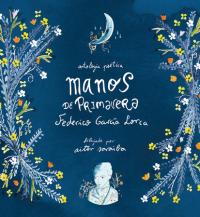 La voz de Lorca ilustrada por la mano poética de Aitor Saraiba.
La voz de Lorca ilustrada por la mano poética de Aitor Saraiba.
La luna, el agua, la tierra, las imágenes lorquianas caminan de la mano de las poéticas ilustraciones de Aitor Saraiba. Una defensa de las voces únicas y las imágenes indestructibles. Un libro, sí, un canto a la libertad y al arte.
Lorca’s voice, illustrated by the poetic hand of Aitor Saraiba.
The moon, water, earth: Lorca’s images go hand-in-hand with the poetic illustrations of Aitor Saraiba. A defense of unique voices and indestructible images. A book—and a song to freedom and art.
Manos de primavera. Antología poética de Federico García Lorca
Hands of Spring : Anthology of Poetry by Federico García Lorca
By Federico Garcia Lorca
Hardcover
Pages: 128
10 x 11
Aug 20, 2019
Published by Montena
PRH Grupo Editoria
Category: Poetry
Spanish Language Nonfiction
ISBN 9788417671419
ISBN-13: 9788417671419
$20.95
# More poetry
Anthology of Poetry
by Federico García Lorca
• fleursdumal.nl magazine
More in: - Book News, 4SEASONS#Spring, Archive K-L, Archive K-L, Art & Literature News, Garcia Lorca, Federico, WAR & PEACE
For the first time in a quarter century, a major new volume of translations of the beloved poetry of Federico García Lorca, presented in a beautiful bilingual edition
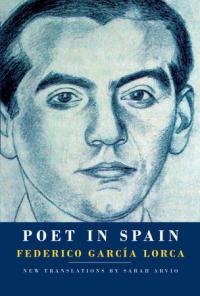 The fluid and mesmeric lines of these new translations by the award-winning poet Sarah Arvio bring us closer than ever to the talismanic perfection of the great García Lorca. Poet in Spain invokes the “wild, innate, local surrealism” of the Spanish voice, in moonlit poems of love and death set among poplars, rivers, low hills, and high sierras.
The fluid and mesmeric lines of these new translations by the award-winning poet Sarah Arvio bring us closer than ever to the talismanic perfection of the great García Lorca. Poet in Spain invokes the “wild, innate, local surrealism” of the Spanish voice, in moonlit poems of love and death set among poplars, rivers, low hills, and high sierras.
Arvio’s ample and rhythmically rich offering includes, among other essential works, the folkloric yet modernist Gypsy Ballads, the plaintive flamenco Poem of the Cante Jondo, and the turbulent and beautiful Dark Love Sonnets—addressed to Lorca’s homosexual lover—which Lorca was revising at the time of his brutal political murder by Fascist forces in the early days of the Spanish Civil War.
Here, too, are several lyrics translated into English for the first time and the play Blood Wedding—also a great tragic poem. Arvio has created a fresh voice for Lorca in English, full of urgency, pathos, and lyricism—showing the poet’s work has grown only more beautiful with the passage of time.
Federico García Lorca may be Spain’s most famous poet and dramatist of all time. Born in Andalusia in 1898, he grew up in a village on the Vega and in the city of Granada. His prolific works, known for their powerful lyricism and an obsession with love and death, include the Gypsy Ballads, which brought him far-reaching fame, and the homoerotic Dark Love Sonnets, which did not see print until almost fifty years after his death. His murder in 1936 by Fascist forces at the outset of the Spanish Civil War became a literary cause célébre; in Spain, his writings were banned. Lorca’s poems and plays are now read and revered in many languages throughout the world.
Sarah Arvio is the author of night thoughts:70 dream poems & notes from an analysis, Sono: Cantos, and Visits from the Seventh: Poems. Winner of the Rome Prize and the Bogliasco and Guggenheim fellowships, among other honors, Arvio works as a translator for the United Nations in New York and Switzerland and has taught poetry at Princeton University.
Poet in Spain
By Federico Garcia Lorca
Translated by Sarah Arvio
Hardcover
576 Pages
Published by Knopf
2017
ISBN 9781524733117
Category: Poetry
$35.00
# More poetry
Federico Garcia Lorca
Poet in Spain
• fleursdumal.nl magazine
More in: - Book News, Archive K-L, Archive K-L, Art & Literature News, Garcia Lorca, Federico, REPRESSION OF WRITERS, JOURNALISTS & ARTISTS, WAR & PEACE
A young woman in Buenos Aires spies three women in the house across the street from her family’s home. Intrigued, she begins to watch them. She imagines them as accomplices to an unknown crime, as troubled spinsters contemplating suicide, or as players in an affair with dark and mysterious consequences.
 Lange’s imaginative excesses and almost hallucinatory images make this uncanny exploration of desire, domestic space, voyeurism and female isolation a twentieth century masterpiece. Too long viewed as Borges’s muse, Lange is today recognized in the Spanish-speaking world as a great writer and is here translated into English for the first time, to be read alongside Virginia Woolf, Clarice Lispector and Marguerite Duras.
Lange’s imaginative excesses and almost hallucinatory images make this uncanny exploration of desire, domestic space, voyeurism and female isolation a twentieth century masterpiece. Too long viewed as Borges’s muse, Lange is today recognized in the Spanish-speaking world as a great writer and is here translated into English for the first time, to be read alongside Virginia Woolf, Clarice Lispector and Marguerite Duras.
Born in 1905 to Norwegian parents in Buenos Aires, Norah Lange was a key figure in the Argentinean avant-garde of the early to mid-twentieth century. Though she began her career writing poetry in the ultraísta mode of urban modernism, her first major success came in 1937 with her memoir Notes from Childhood, followed by the companion memoir Before They Die, and the novels People in the Room and The Two Portraits.
She contributed to the magazines Proa and Martín Fierro, and was a friend to figures such as Jorge Luis Borges, Pablo Neruda, and Federico García Lorca. From her teenage years, when her family home became the site of many literary gatherings, Norah was a mainstay of the Buenos Aires literary scene, and was famous for the flamboyant speeches she gave at parties in celebration of her fellow writers. She traveled widely alone and with her husband, the poet Oliverio Girondo, always returning to Buenos Aires, where she wrote in the house they shared, and where they continued to host legendary literary gatherings. She died in 1972.
Charlotte Whittle has translated works by Silvia Goldman, Jorge Comensal, and Rafael Toriz, among others. Her translations, essays, and reviews have appeared in publications including Mantis, The Literary Review, The Los Angeles Times, Guernica, Electric Literature, BOMB, and the Northwest Review of Books. Originally from England and Utah, she has lived in Mexico, Peru, and Chile, and is now based in New York. She is an editor at Cardboard House Press, a bilingual publisher of Spanish and Latin American poetry.
“Deathly scenes from a wax museum come to life, in a closed, feminine world.” – César Aira
People in the Room
Author: Norah Lange
Translator: Charlotte Whittle
Introduced by César Aira
Language: English
Original language: Spanish
Publisher: And Other Stories
Format: paperback
Publication date: 9 August 2018
ISBN: 9781911508229
Availability: World
Number of pages: 176
Price: €11.09
new books
novel Norah Lange (1905 – 1972)
fleursdumal.nl magazine
More in: - Book News, - Bookstores, Archive K-L, Art & Literature News, Borges J.L., Garcia Lorca, Federico, Libraries in Literature, LITERARY MAGAZINES, Neruda, Pablo
For the first time in a quarter century, a major new volume of translations of the beloved poetry of Federico García Lorca, presented in a beautiful bilingual edition.
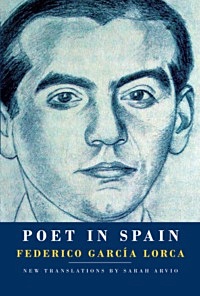 The fluid and mesmeric lines of these new translations by the award-winning poet Sarah Arvio bring us closer than ever to the talismanic perfection of the great García Lorca. Poet in Spain invokes the “wild, innate, local surrealism” of the Spanish voice, in moonlit poems of love and death set among poplars, rivers, low hills, and high sierras.
The fluid and mesmeric lines of these new translations by the award-winning poet Sarah Arvio bring us closer than ever to the talismanic perfection of the great García Lorca. Poet in Spain invokes the “wild, innate, local surrealism” of the Spanish voice, in moonlit poems of love and death set among poplars, rivers, low hills, and high sierras.
Arvio’s ample and rhythmically rich offering includes, among other essential works, the folkloric yet modernist Gypsy Ballads, the plaintive flamenco Poem of the Cante Jondo, and the turbulent and beautiful Dark Love Sonnets—addressed to Lorca’s homosexual lover—which Lorca was revising at the time of his brutal political murder by Fascist forces in the early days of the Spanish Civil War.
Here, too, are several lyrics translated into English for the first time and the play Blood Wedding—also a great tragic poem. Arvio has created a fresh voice for Lorca in English, full of urgency, pathos, and lyricism—showing the poet’s work has grown only more beautiful with the passage of time.
Federico Garcia Lorca may be Spain’s most famous poet and dramatist of all time. Born in Andalusia in 1898, he grew up in a village on the Vega and in the city of Granada.
His prolific works, known for their powerful lyricism and an obsession with love and death, include the Gypsy Ballads, which brought him far-reaching fame, and the homoerotic Dark Love Sonnets, which did not see print until almost fifty years after his death.
His murder in 1936 by Fascist forces at the outset of the Spanish Civil War became a literary cause célébre; in Spain, his writings were banned. Lorca’s poems and plays are now read and revered in many languages throughout the world.
Poet in Spain
By Federico Garcia Lorca
Translated by Sarah Arvio
Category: Poetry
Hardcover
Nov 07, 2017
576 Pages
$35.00
Published by Knopf
ISBN 9781524733117
new books
fleursdumal.nl magazine
More in: - Book News, Archive G-H, Archive G-H, Art & Literature News, Garcia Lorca, Federico, WAR & PEACE
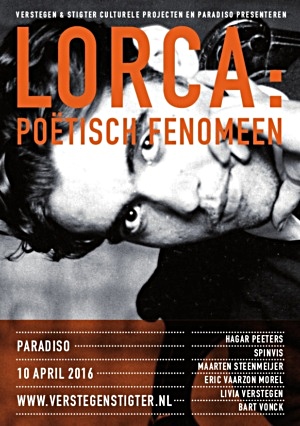 Lorca: poëtisch fenomeen
Lorca: poëtisch fenomeen
zondag 10 april 2016, Paradiso Amsterdam
Op 19 augustus 2016 is het tachtig jaar geleden dat Federico García Lorca, nog geen maand na het uitbreken van de Spaanse Burgeroorlog, op 38-jarige leeftijd door de monarchisten werd vermoord in een olijfgaard bij Viznar in de buurt van Granada in Zuid-Spanje. Met het programma Lorca: poëtisch fenomeen eren we een van de belangrijkste representanten van de 20ste eeuwse Spaanse literatuur, en belichten we in taal en muziek een aantal facetten van Lorca’s poëzie.
PROGRAMMA
Zondag 10 april, Paradiso Amsterdam
11.00 – 13.30 uur
Hagar Peeters spreekt over de vriendschap tussen Lorca en Pablo Neruda, en het gedicht dat Lorca schreef over Neruda’s dochter Malva.
Spinvis speelt De kip – een prozagedicht van Lorca op muziek gezet door Spinvis.
Maarten Steenmeijer analyseert een paar gedichten van Lorca bij wijze van inleiding op diens poëzie, die vaak meer ‘gevoeld’ dan ‘begrepen’ wordt.
Eric Vaarzon Morel vertelt over de relatie van Lorca tot flamenco en speelt een aantal stukken die samenhangen met gedichten uit Romancero Gitano en Poema del Cante Jondo.
Livia Verstegen gaat in haar inleiding Lorca: folklorist of toch meer surrealist? in op twee belangrijke elementen in het poëtisch oeuvre van de dichter.
Bart Vonck zoekt in zijn lezing Lorca en de marge naar een antwoord op de vraag waarom Lorca maatschappelijke en artistieke categorieën die in zijn tijd marginaal waren, zo’n cruciale plaats gaf in zijn werk.
Lorca: poëtisch fenomeen
zondag 10 april 2016, Paradiso, Amsterdam
Zaal open: 10:30
Aanvang: 11:00
Prijs: € 22,50 / € 15 / € 10
# Meer info website Paradiso
fleursdumal.nl magazine
More in: Archive K-L, Art & Literature News, Garcia Lorca, Federico, MUSIC, Peeters, Hagar, THEATRE
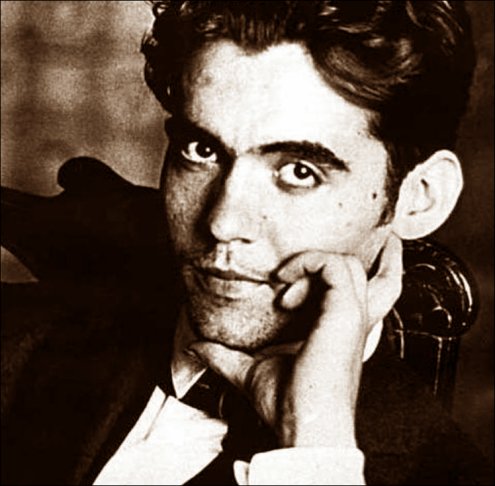
Federico Garcia Lorca
(1898-1936)
Piccolo Valzer Viennese
A Vienna ci sono dieci ragazze,
una spalla dove piange la morte
e un bosco di colombe disseccate.
C’e’ un frammento del mattino
nel museo della brina.
C’è un salone con mille vetrate.
Ahi! Ahi! Ahi! Ahi!
Prendi questo valzer con la bocca chiusa.
Questo valzer, questo valzer, questo valzer,
di sì, di morte e di cognac
che si bagna la coda nel mare.
o ti amo, io ti amo, io ti amo
con la poltrona e con il libro morto,
nel malinconico corridoio,
nell’oscura soffitta del giglio,
nel nostro letto della luna,
nella danza che sogna la tartaruga.
Ahi! Ahi! Ahi! Ahi!
Prendi questo valzer dalla spezzata cintura.
A Vienna ci sono quattro specchi,
vi giocano la tua bocca e gli echi.
C’è una morte per pianoforte
che tinge d’azzurro i giovanotti.
Ci sono mendichi sui terrazzi. E
fresche ghirlande di pianto.
Ahi! Ahi! Ahi! Ahi!
Prendi questo valzer che spira fra le mie braccia.
Perchè io ti amo, ti amo, amore mio,
nella soffitta dove giocano i bambini,
sognando vecchie luci d’Ungheria
nel mormorio di una sera mite,
vedendo agnelli e gigli di neve
nell’oscuro silenzio delle tue tempie.
Ahi! Ahi! Ahi! Ahi!
Prendi questo valzer del “Ti amo per sempre”.
A Vienna ballerò con te
con un costume che abbia la testa di fiume.
Guarda queste mie rive di giacinti!
Lascerò la mia bocca tra le tue gambe,
la mia anima in foto e fiordalisi,
e nelle onde oscure del tuo passo io voglio,
amore mio, amore mio, lasciare,
violino e sepolcro, i nastri del valzer.
Federico Garcia Lorca: Piccolo Valzer Viennesse
fleursdumal.nl magazine
More in: Archive G-H, Garcia Lorca, Federico

Federico Garcia Lorca
(1898-1936)
El Balcón
Si muero
Dejad el balcón abierto
El niño come naranjas
(Desde mi balcón lo veo)
El segador siega el trigo
(Desde mi balcón lo siento)
Si muero
Dejad el balcón abierto

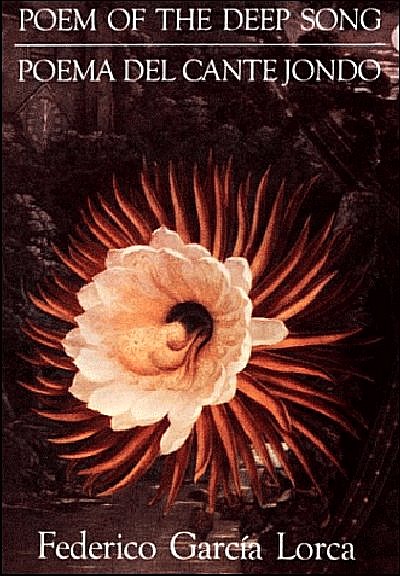
Soneto
Largo espectro de plata conmovida
el viento de la noche suspirando,
abrió con mano gris mi vieja herida
y se alejó: yo estaba deseando.
Llaga de amor que me dará la vida
perpetua sangre y pura luz brotando.
Grieta en que Filomela enmudecida
tendrá bosque, dolor y nido blando.
¡Ay qué dulce rumor en mi cabeza!
Me tenderé junto a la flor sencilla
donde flota sin alma tu belleza.
Y el agua errante se pondrá amarilla,
mientras corre mi sangre en la maleza
mojada y olorosa de la orilla.
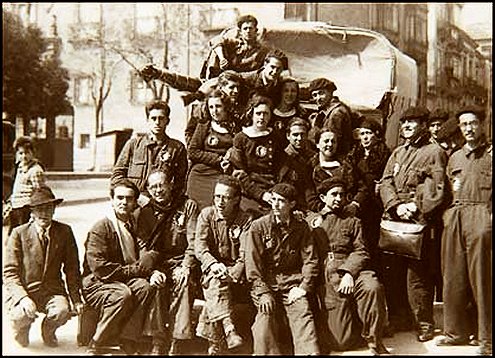
Federico Garcia Lorca poetry
fleursdumal.nl magazine
More in: Archive K-L, Garcia Lorca, Federico
Thank you for reading Fleurs du Mal - magazine for art & literature